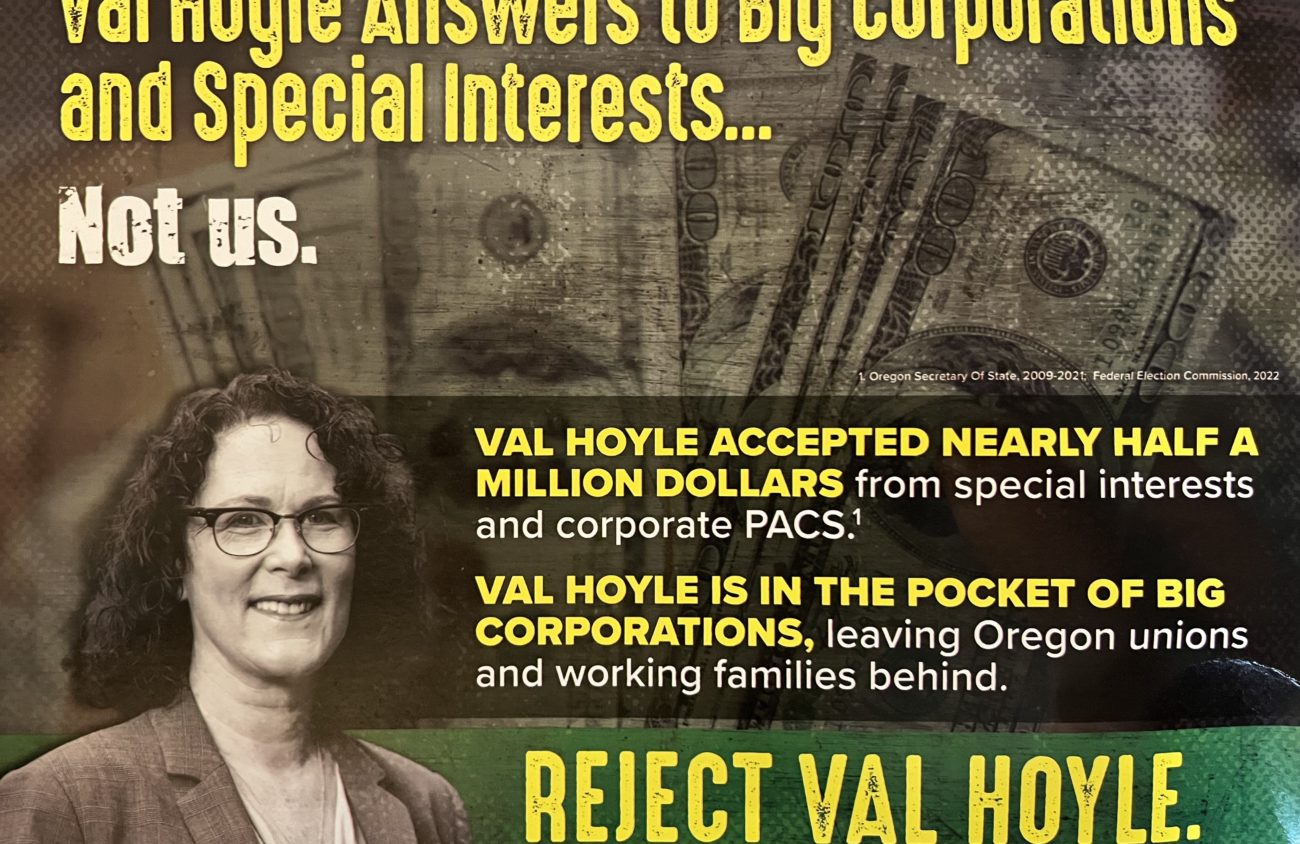“Reject Val Hoyle,” reads a flyer sent to many residents in Eugene-Springfield and other cities in the 4th Congressional District. “She’s with them, not us!”
On the surface it looks like typical anti-Hoyle campaign literature sent by her Republican opponent Alek Skarlatos. But rather than urging voters to vote Republican, the flyer supports Pacific Green Party Candidate Mike Beilstein.
Beilstein condemned the literature — and the dark money funding it — as has Doyle Canning, Hoyle’s rival from the Democratic primary, as a way to confuse and discourage liberal and progressive voters.
“It’s a cynical attempt to hijack the message of climate voters and progressives,” Canning says. The literature is a way to sow confusion in voters intentionally, she adds, to boost “ultra MAGA” Skarlatos, who will side with polluters and tax cuts for billionaires, as well as threaten fundamental freedoms, such as marriage and access to health care. “That’s what’s at stake in this election. That’s why I’m supporting Democrat Val Hoyle.”
On Oct. 25, Beilstein sent out a press statement disavowing the flyer, saying that he doesn’t discourage people from voting for him, but he denounces the use of dark money to mislead voters in an attempt to split the liberal vote and hand the 4th Congressional District to Republican Skarlatos.
Beilstein tells Eugene Weekly that while the flyer represents his political views, such as supporting the Green New Deal and holding corporations accountable, but, he adds, he doesn’t attack opponents, whether it’s Hoyle or Skarlatos.
Green Oregon is the super Pac behind the independent expenditure, and it was formed Oct. 19 by treasurer Nathaniel Lopez, a frequent Republican contributor who gave $300 to President Donald Trump’s campaign and $895 to the Republican WinRed committee in 2020. Lopez discloses a Eugene address at a FedEx mailbox at 4736 Royal Avenue in the Green Oregon super PAC filing, but his campaign contributions to Trump show him as a Virginia resident who works as an entrepreneur.
According to Federal Election Campaign rules, an independent expenditure supports or opposes a candidate and is not made in coordination with a candidate or their campaign or political party.
In recent years, super PACs have used a calendar loophole to hide funding sources. According to a report on the 2018 midterm general election by Campaign Legal Center, a Washington, D.C.-based nonprofit, “mysterious super PACs popped up in the weeks before Election Day, spent five, six or seven figures on ads, and combined legally dubious accounting tricks with reporting calendar loopholes to keep voters in the dark about the sources of their funding until well after voters cast their ballots.”
Canning criticized the use of dark money in the May primary when she ran against Hoyle.
Canning says that dark money interests are dropping tens of thousands of dollars — and dropped up to half a million in the primary — and are involved with the election because they think they can make a difference in the outcome. “The difference they want to make is a fractional one,” she adds. “They wouldn’t be spending to boost a Green Party candidate who said on the record that he doesn’t expect to get 3 percent of the vote.”
The flyer is an act of desperation, Canning adds, and shows the length conservatives will go to. “Dirty tricks and dark money are par for the course for Republican interests who want to install ultra MAGA politicians who will do their bidding in Washington,” she says.
